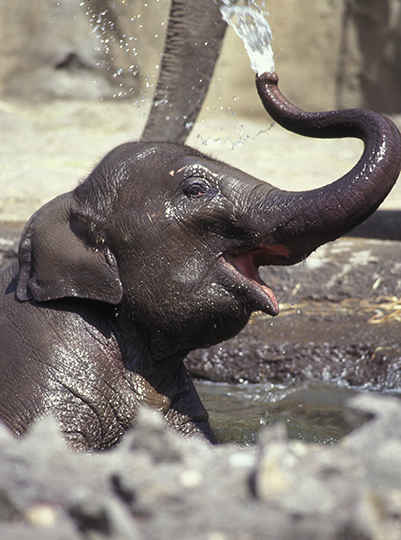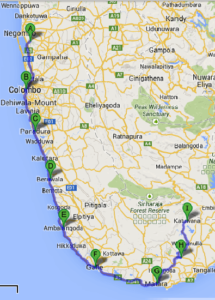 How Derived: Past Life Memories in Childhood
How Derived: Past Life Memories in Childhood
Researchers: Ian Stevenson, MD and Francis Story
From: Cases of the Reincarnation Type, Volume II, Ten Cases in Sri Lanka, by Ian Stevenson, MD
Article by: Walter Semkiw, MD
The Life and Death of K.G.J. Weerasinghe
Weerasinghe was born in 1888 in village of Wehelgoda, which is 2 miles east of Matara, a city located on the southern tip of the Sri Lankan coast. Matara, at the time, had a population of about 75,000 people and is located 200 kilometers or 125 miles from the capital city of Colombo.
Weerasinghe had only four or five years of schooling but was obvously very intelligent, as he built up a large and successful businesses as a lumber merchant and building contractor. After saving his money, he eventually became the wealthiest citizen of Matara, employing some of his family members. He also had servants, one of whom had the name Premadasa. Weerasinghe had a safe or money-box where he kept cash and valuables. He also owned a gun, which he used for hunting. His home was burglarized once, which is another reason Weerasinghe possessed a gun.
Weerasinghe’s Love of Elephants
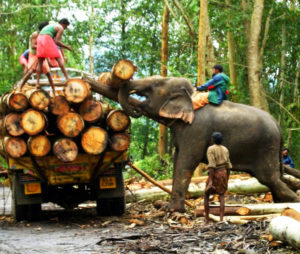 Weerasinghe owned several houses and estates in the country, where he kept cattle and elephants. Elephants worked in hauling lumber. He also had elephants at his home compound in Matara, which was located near railroad tracks.
Weerasinghe owned several houses and estates in the country, where he kept cattle and elephants. Elephants worked in hauling lumber. He also had elephants at his home compound in Matara, which was located near railroad tracks.
Weerasinghe had a great fondness for these giant beasts and he instructed that on weekends, the elephants were not to be put to work until he arrived in the morning to feed and play with them. The elephants, including a baby pachyderm, would squirt water at their owner, which delighted Weerasinghe,
Owning elephants in Sri Lanka can only be afforded by the very wealthy and this fact was instrumental in investigating this reincarnation case.
Generosity to Premadasa and Others
Weerasinghe, once he established his wealth, was generous and was able to give houses and whole estates to his employees, including his business manager and his servant Premadasa. He was also supportive to his nephew, his older brother’s son, and took in this nephew and his wife to live with him. The couple had a daughter named Padminie.
Weerasinghe’s “Benz”
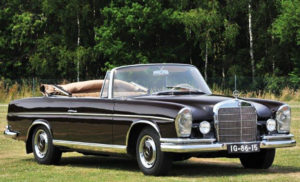 Weerasinghe liked to live on a grand scale and he regularly would buy a bigger house and a larger, more luxurious automobile. He started out with a small Austin and in 1957, he put in the paperwork to purchase a prestigious Mercedes Benz vehicle, but he backed out at the last minute when the price suddenly rose. He also had Ford and Chevrolet trucks, which were used for his lumber business. Weerasinghe liked to boast about his accomplishments and possessions. He indeed had become what in Sri Lanka is known as a “mudalali,” which refers to an aggressive, action-oriented and successful businessman.
Weerasinghe liked to live on a grand scale and he regularly would buy a bigger house and a larger, more luxurious automobile. He started out with a small Austin and in 1957, he put in the paperwork to purchase a prestigious Mercedes Benz vehicle, but he backed out at the last minute when the price suddenly rose. He also had Ford and Chevrolet trucks, which were used for his lumber business. Weerasinghe liked to boast about his accomplishments and possessions. He indeed had become what in Sri Lanka is known as a “mudalali,” which refers to an aggressive, action-oriented and successful businessman.
A redeeming quality was his kindness to Buddhist monks. He himself was a devout Buddhist who built several temples, rest houses for pilgrims and who donated estates to Buddhist temples. He made almost weekly trips to the holy site where the Hindu God Kataragama is worshipped by both Buddhists and Hindus. Each year thousands of pilgrims took the train to Matara to pray at the Kataragama temple. Weerasinghe also loved children and was generous to them.
Gambling, Drinking, Womanizing and Rage
Weerasinghe was an enthusiastic gambler and he could afford to wager large sums of money. He also widely participated in lotteries. Between 1958 to 1959 he won nearly 100,000 Rupees at cards, which was an enormous sum. He was so skilled at cards that professional gamblers refused to play with him.
He enjoyed alcohol and was a heavy drinker for many years, though after 1945, he reduced his consumption. Still, he drank alcohol every night with friends, consuming whiskey and arrack. In addition, he chased woman when it pleased him.
Weerasinghe had a temper, though his rages were short-lived. Still, many feared him. He threatened to beat his servants when they disappointed him, though he never did so. Once, he had an argument with someone who was gambling with him and Weerasinghe severely beat this man. In revenge, this individual threatened to shoot Weerasinghe, though friends dissuaded this course of action.
Marriage, Adoption and Demise
Weerasinghe married B.E. Abeynayake, but it turned out to be a difficult union. She objected to his gambling, drinking and womanizing, which resulted in frequent arguments. Due to their conflicts, Weerasinghe forbade her family members to enter their home.
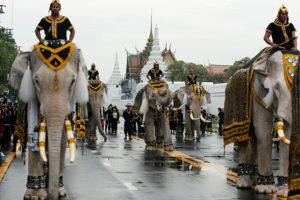 In 1960, he decided to separate from his wife and he sent her away. Weerasinghe’s brother later helped the couple reconcile and she returned to the family’s home in Matara. The couple had no children, so Weerasinghe formally adopted Padminie as his daughter, thus assuring her financial security for the future.
In 1960, he decided to separate from his wife and he sent her away. Weerasinghe’s brother later helped the couple reconcile and she returned to the family’s home in Matara. The couple had no children, so Weerasinghe formally adopted Padminie as his daughter, thus assuring her financial security for the future.
Weerasinghe had diabetes and had to be hospitalized several times for this condition. In December 1960 he complained of pain in his toe and he had his servant, Premadasa, drive him to Colombo where he was admitted into the central hospital. There he developed urinary retention and deteriorated rapidly. He died on December 18, 1960 at the age of 72. Those present at his bedside when he passed included his older brother and Premadasa. Padminie, who was 11 years of age at the time, was not present when her adoptive father died.
He had a large funeral with four adult elephants in attendance, dressed in white, which was Weerasinghe’s favorite color, as well as the color of mourning in Sri Lanka.
Weerasinghe Reincarnates 18 Miles from his Place of Death
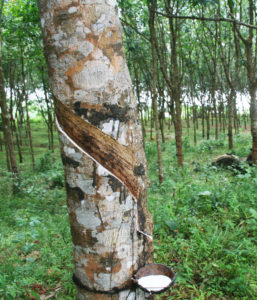 Indika Guneratne was born on July 26, 1962, less than two years after Weerasinghe died. His father, a farmer, was G.D. Guneratne and his mother’s name was S.D. Harriet. The family lived deep in a jungle that featured rubber plantations in an area called Korale Ima, which is 30 kilometers or 18 miles from Colombo. The family lived in a small house on a rubber plantation.
Indika Guneratne was born on July 26, 1962, less than two years after Weerasinghe died. His father, a farmer, was G.D. Guneratne and his mother’s name was S.D. Harriet. The family lived deep in a jungle that featured rubber plantations in an area called Korale Ima, which is 30 kilometers or 18 miles from Colombo. The family lived in a small house on a rubber plantation.
When Indika was a little over three years of age, he started to talk about a previous life and claimed that he had lived in Matara. In comparison to the modest circumstances of his parents, Indika said that he had been wealthy, had a much larger and more beautiful house than his current home and that he owned elephants.
He complained that the Guneratne home did not have electricity, in contrast to his past life home where he could turn on lights by moving something on the wall, presumably a switch. He noted these lights did not leak, in contrast to the kerosene lamps that the Guneratne family used. He also commented on the paucity of meat and the poor quality of the fish at their dinner table, as well as the shabbiness of his mother’s clothing.
Past Life “Benz,” Telephone, Bundles of Money, Railroad Tracks and a Servant Named Premadasa
 In addition, Indika said that in his past life he owned a car and trucks. He specified that his car was a “Benz.” Indika, as a child, had an avid interest in automobiles and noted differences between his past life cars and those he inspected around their village.
In addition, Indika said that in his past life he owned a car and trucks. He specified that his car was a “Benz.” Indika, as a child, had an avid interest in automobiles and noted differences between his past life cars and those he inspected around their village.
He also said that he had a telephone at his past life home, an item not possessed by the Guneratne family. Indika even demonstrated how he used it by putting his hand near his mouth and saying “Hello,” which is a word commonly used in Sri Lanka when answering the phone. This, indeed, was the word that Weeasinghe had used when answering a phone call.
Indika told his parents that he had “bundles of money” and that if they took him to Marata, “then I can give you the money.” When something angered Indika, he would threaten to go to Matara. Indika also shared that he had a servant named Premadasa.
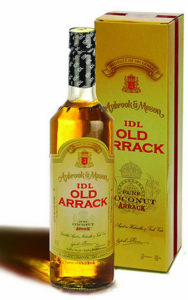 In referring to the location of his past life home, he related that it was near the railroad tracks in Matara. His parents were astonished that he used the words “railroad tracks” as at his young age, Indika had never seen a railroad train or tracks and his parents didn’t believe that anyone around him had ever used these words. He also related that there had been a burglary at his past life home.
In referring to the location of his past life home, he related that it was near the railroad tracks in Matara. His parents were astonished that he used the words “railroad tracks” as at his young age, Indika had never seen a railroad train or tracks and his parents didn’t believe that anyone around him had ever used these words. He also related that there had been a burglary at his past life home.
Past Life Habits
Indica shared that he had taken alcohol in his previous life and that his past life wife had objected to this habit. His father asked how he would ask for a drink. To this question Indika replied, “arraku bagayuk,” which is a phrase used in Sri Lanka meaning “pour me a small drink of arrack.” It was noted that this was a very unusual phrase for a young child to know.
On Sundays he would say: “I must go to Colombo to buy saris for my wife and clothing for my children.” When his mother asked him if he knew how to buy saris he said that he knew. Later it was confirmed that Weerasinghe indeed would go to Colombo on Sundays to shop for saris his wife and clothing for other family members.
Indika Relives Elephant and Other Past Life Memories
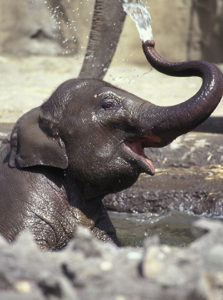 Indika would describe with glee how in his past life he played with his elephants, including how his baby elephant would squirt water on him. It was as if Indika was reliving these moments and his father observed that: “Though his body appears to be here, his mind appears to be there,” meaning in his previous life at Matara.
Indika would describe with glee how in his past life he played with his elephants, including how his baby elephant would squirt water on him. It was as if Indika was reliving these moments and his father observed that: “Though his body appears to be here, his mind appears to be there,” meaning in his previous life at Matara.
There were also other times when Indika seemed to forget where he was and act as if he was actually in Matara. During these episodes, he would say:
“Where is my money-box?”
“Where is my gun?”
Indika said that he had a child in his previous life, apparently referring to his adopted daughter Padminie. When asked how old his child was, Indika stretched his hand as high as he could, indicating that she was that tall. Recall that Padminie was eleven years old when Weerasinghe died.
When Indika incurred an injury to his lip, he told his mother to inform “his wife.” When she asked how to find his wife, Indika replied he would go to Colombo and then to Matara. He noted that his car would be there. He would ask for his past life wife at other times when he did not feel well.
When asked by his parents how he came to live with them, Indika related that he had an argument with his wife and then came to his new home.
Ian Stevenson, MD Investigates this Reincarnation Case
Based on this information, Indika’s father make inquires of friends who had lived in Matara or who knew people in that city. He learned that there was an individual in Matara who fit the description that Indika gave and that this person’s family name was Weerasinghe. Indika’s family did nothing further to try to locate or contact the Weerasinghe family.
Indica stop talking about his previous life at the end of 1966, when he was about 4 ½ years old.
About two years later, in January 1968, Ian Stevenson, MD first learned about Indika’s past life memories when he received a letter regarding the case written by V. F. Guneratne, an apparent relative of Indika’s family. Stevenson traveled with his colleague, Francis Story, to meet Indika and his family in March 1968.
After meeting with the Guneratne family in Korale Ima and compiling the statements made by Indikka regarding his previous life, Stevenson, Francis Story, Indika and Indika’s father traveled the 100 miles or so from Korale Ima to Matara to further research the case. Though an acquaintance of Indika’s father indicated that a Matara businessman named Weerasinghe matched the description of Indika’s past memories, Stevenson wanted to see if other businessmen in Matara could be candidates for Indika’s past life persona.
A Search for Wealthy Businessmen with Elephants
The key clue was a wealthy businessman who owned elephants. Stevenson’s investigation revealed only two other deceased businessmen who owned elephants in Matara. Stevenson concluded that Indika’s statements did not correlate to these two individuals and it was concluded that Indika’s past life identity must have been that of Weerasinghe.
The group then made their way to the home of the Weerasinghe family. Stevenson beforehand ascertained that Indika’s family and the Weerasinghe family had no prior contact and indeed, when the two families met, Stevenson’s impression was that both families acted as if they were encountering each other for the first time. Stevenson concluded that Indika could not have known the details of Weerasinghe’s life by normal means.
Indika, though, did not make any concrete identifications at the Weerasinghe home. Stevenson attributed this to the fact that Indika, now about six years of age, had stopped talking about his past life almost 2 years beforehand. In the series of 1200 validated childhood past life memory cases studied by Ian Stevenson at the University of Virginia, the child, on average, loses memories of the past life at 7.5 years of age. Stevenson concluded that Indika was not able to make identifications of past life relatives in Matara simply because it was too late, that Indika had lost access to memories of his life as Weerasinghe.
Past Life Personality Traits Persist
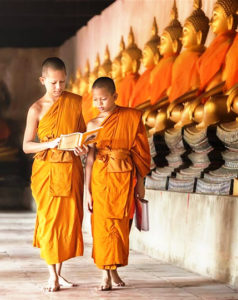 Ian Stevenson noted there were many similarities in the personalities of Weerasinghe and Indika. Both had:
Ian Stevenson noted there were many similarities in the personalities of Weerasinghe and Indika. Both had:
The favorite color of white
A fear of burglars
A tendency to save money
Great fondness of elephants and an interest in cattle
Respect for Buddhist monks
A fondness for meat and high-quality fish
An avid interest in motor vehicles
A tendency to be boastful and bragging
A hot temper
A fondness for dogs and dislike of cats
Ian Stevenson visited the Guneratne family again in 1973, when Indika was 11 years old. Though he had stopped talking about his past life when he was four and a half years old, Indika still displayed the behaviors of his past life persona. He continued to demand high quality food and clothes, had an avid interest in elephants, lottery tickets and automobiles, which he would try to start, and he still had a quick temper. When Stevenson asked Indika wanted to become when he grew up, he replied, surprising no one, a “mudalali,” that is, his past life profession as an aggressive, successful businessman.
Principles of Reincarnation-Understanding Past Lives
Past Life Talents and Behavior: Indika had the same personality traits and interests as Weerasinghe, including a tendency to save money to accumulate wealth.
Relationships Renewed through Reincarnation: Indika was able to meet his past life family.
Source: Stevenson, Ian: Cases of the Reincarnation Type, Volume II, Ten Cases in Sri Lanka, pages 203-234
